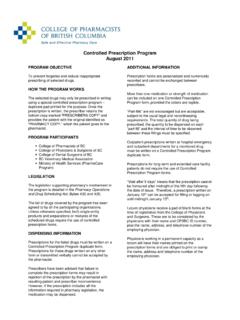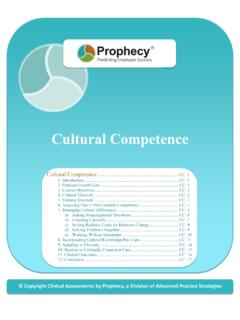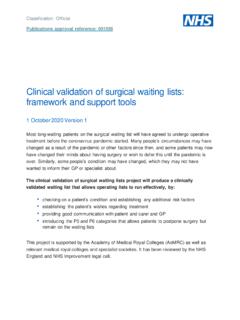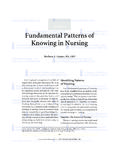Transcription of Amendments to Orientation Guide Medication Management ...
1 PPP58_AmendmentOrientationGuide Revised 2016-10-07 IMPORTANT INFORMATION Amendment to Orientation Guide Medication Management ( adapting a prescription ) (December 2008 revised February 2011/April 2016/October 2016) Topic Current wording in Orientation Guide Reference in Orientation Guide Clarification / Update prescription (Fundamental 3) You must have an original prescription (an authorization from a practitioner to dispense a specified drug for use by a designated individual) and it must be current, authentic, and otherwise appropriate for the patient. Section ; page 7. October 2016: Pharmacists may adapt an original prescription , including the first and subsequent refills of that prescription , in accordance with PPP-58. The adaptation does not need to be the beginning of a new drug therapy. Original prescriptions do not include transferred prescriptions, previously adapted prescriptions, or emergency refills.
2 PPP58_AmendmentOrientationGuide Revised 2016-10-07 Topic Current wording in Orientation Guide Reference in Orientation Guide Clarification / Update Liability Insurance Minimum requirements for liability insurance: Personal professional liability insurance (minimum $2 million) Section ; Page 19 December 2008: Minimum requirements for liability insurance are: The policy provides a minimum of $2 million coverage, and The policy provides occurrence-based coverage or claims-made coverage with an extended reporting period of at least three years, and If not issued in the pharmacist s name, the group policy covers the pharmacist as an individual. February 2011: No change April 2016: No change October 2016: No change Handwritten notation from prescriber Do Not Renew / Adapt (or similar) review .. the acknowledgement of any hand-written notations on the prescription by the prescriber.
3 Section ; Page 7 December 2008: Pharmacists will honour hand-written (not pre-stamped) Do Not Renew / Adapt notification on prescriptions If a prescriber electronically produces their prescriptions they must sign or initial beside the notation February 2011: No change April 2016: No change October 2016: No change PPP58_AmendmentOrientationGuide Revised 2016-10-07 Topic Current wording in Orientation Guide Reference in Orientation Guide Clarification / Update Renewals specific conditions &/or drugs No limits and/or conditions stated n/a December 2008: Renewals apply to stable, chronic conditions (same Medication , with no change, for a minimum of six months) For psychiatric medications renewals are reserved for pharmacists working in multidisciplinary teams February 2011: Renewals apply to stable, chronic conditions (same Medication , with no change) Note: no change is defined as usually a minimum of six months For psychiatric medications renewals are reserved for pharmacists working in multidisciplinary teams April 2016: No change October 2016: No change Renewals length of time for whatever period of time felt appropriate as long as it does not exceed the expiry of the prescription Section ; Page 15 and Section ; Page 7 December 2008: Maximum renewal up to 6 months from the date of the original prescription February 2011: For whatever period of time felt appropriate as long as it does not exceed the expiry of the prescription Note: All prescriptions have an expiry of one year from the date the original prescription is written.
4 Oral contraceptives have a 2 year expiry date April 2016: No change October 2016: No change PPP58_AmendmentOrientationGuide Revised 2016-10-07 Topic Current wording in Orientation Guide Reference in Orientation Guide Clarification / Update Change: dose or regimen No limits and/or conditions stated Section ; Page 14 December 2008: Unless in practice settings such as hospital, long-term care facilities or multi-disciplinary environments where collaborative relationships or appropriate protocols are established, pharmacists: Will not change the dose or regimen of prescriptions for: cancer, cardio-vascular disease, asthma, seizures or psychiatric conditions Pharmacists can complete missing information on a prescriptions if there is historical evidence to support it February 2011: No change April 2016: No change October 2016: No change Therapeutic Substitution No limits and/or conditions stated Section.
5 Page 16 December 2008: Unless in practice settings such as hospital, long-term care facilities or multi-disciplinary environments where collaborative relationships or appropriate protocols are established, pharmacists: Will limit therapeutic substitution to: Histamine 2 receptor blockers (H2 blockers), Non-steroidal anti-inflammatory drugs (NSAIDs), Nitrates, Angiotension converting enzyme inhibitors (ACE inhibitors), Dihydropyridine calcium channel blockers (dihydropyridine CCBs) and Proton pump inhibitors (PPIs) February 2011: No change October 2016: No change PPP58_AmendmentOrientationGuide Revised 2016-10-07 Topic Current wording in Orientation Guide Reference in Orientation Guide Clarification / Update April 2016: Unless in practice settings such as hospital, long-term care facilities or multi-disciplinary environments where collaborative relationships or appropriate protocols are established, pharmacists: Will limit therapeutic substitution to those categories under the Ministry of Health s Reference Drug Program, the updated list can be accessed here: #rdp October 2016: No change Orientation Guide Professional Practice Policy #58 - Medication Management ( adapting a prescription ) College of Pharmacists of BC Foreword P 1 1017-PPP58_OrientationGuide Revised 2016-10-07 Foreword Medication Management is an umbrella term that encompasses all professional activities that a pharmacist undertakes, as the Medication experts, to optimize safe and effective drug therapy outcomes for patients.
6 Pharmacists involvement in Medication Management activities will continue to expand as the needs of patients and the demands of the healthcare system continue to increase. This point was reinforced throughout the February 2008 Throne Speech where the provincial government acknowledged the challenges of sustaining the current healthcare system and called on all healthcare professionals to practice to their full scope as a means of helping to alleviate pressure from the system. This led to the introduction of Bill 25 The Health Professions (Regulatory Reform) Amendment Act, 2008 which, specific to the pharmacy profession, formalizes a pharmacist s authority to renew existing prescriptions . The College of Pharmacists of BC s Professional Practice Policy #58 (PPP-58) entitled Protocol for Medication Management adapting a prescription , approved by College council in September 2007, provides the framework to Guide pharmacists in the safe and effective adaptation, including renewal, of existing prescriptions.
7 PPP-58 is applicable to pharmacists in all practice settings, including community, long-term care, hospital and other institutional pharmacy settings. This policy, which provides the opportunity for pharmacists to maximize their full educational and professional competencies, also provides structure to, and refines the process of, exercising professional judgment in clinical practice. This becomes increasingly important as pharmacists evolve their role as Medication experts and assume accountability for their drug therapy decisions. Although it is not mandatory that a pharmacist adapt a prescription , given that PPP-58 enhances pharmacist s scope of practice, it is mandatory that all registrants: Acknowledge that they have read and understood PPP-58 (by signing the Declaration Form included in this Guide ) Should a pharmacist choose to adapt a prescription , in addition to having read and understood the Orientation Guide , a pharmacist must: Possess personal professional liability insurance (minimum $2 million) and must adhere to all of the seven fundamentals for adapting a prescription as outlined in PPP-58 College of Pharmacists of BC How to Use This Guide P 2 1017-PPP58_OrientationGuide Revised 2016-10-07 How to Use This Guide This Orientation Guide (the Guide ) is a companion to the actual policy PPP-58 which can be found in Appendix A.
8 The intention of the Guide is to provide further detail and clarity (including practical examples) to assist pharmacists in the implementation of the policy into practice and ensure that adaptations are done safely and effectively. For clarity, a Glossary of Terms specific to PPP-58 can be found in Appendix B. It is important to note that this document is a Guide only and is not intended to cover all possible practice scenarios. As with all professional activities, pharmacists must use sound professional judgment when adapting a prescription . It will take you about 2 hours to read through this Guide . Assuming that after reading the Guide you are confident that you understand the content you need to sign the Declaration Form (final page of Guide ) and retain it in your files. Should you require further clarification, you may contact the College at Disclaimer This Guide provides interpretation of PPP-58 under the statutes that govern the pharmacy profession in British Columbia.
9 As a professional health practitioner in a self-regulated profession, you the pharmacist are responsible for understanding and practicing according to all relevant requirements and laws. You have a responsibility as a professional for interpreting and applying PPP-58 and the contents of this Guide within the context of your own practice. Acknowledgement Thank you to the Alberta College of Pharmacists for sharing their materials and experiences from their work on implementing practice standards for adapting a prescription in Alberta. Thank you to the BC Pharmacy Association for their participation in the Working Group that created this Orientation Guide . Feedback Questions and comments about this Orientation Guide are welcome and can be sent to: Bob Nakagawa, Registrar College of Pharmacists of BC 200 1765 West 8th Avenue Vancouver, BC V6J 5C6 Phone: or Fax: or E-mail: of Pharmacists of BC Table of Contents P 3 1017-PPP58_OrientationGuide Revised 2016-10-07 Table of Contents Foreword.
10 1 How to Use This Guide .. 2 Disclaimer .. 2 Acknowledgement .. 2 Feedback .. 2 Table of Contents .. 3 Introduction .. 4 Overview .. 4 Important Facts .. 4 Bottom-line .. 5 Objectives .. 5 About PPP-58 Medication Management ( adapting a prescription ) .. 6 Seven Fundamentals of adapting a prescription .. 6 Individual Competence (Fundamental 1) .. 6 Appropriate Information (Fundamental 2) .. 7 prescription (Fundamental 3) .. 7 Appropriateness of Adaptation (Fundamental 4) .. 8 Informed Consent (Fundamental 5) .. 9 Documentation (Fundamental 6) .. 11 Notification of Other Health Professionals (Fundamental 7) .. 12 Activities considered adapting a prescription .. 13 Changing the Dose, Formulation, or Regimen of a New prescription .. 14 Renewing a Previously Filled prescription for Continuity of Care .. 15 Making a Therapeutic Drug Substitution within the Same Therapeutic Class.












